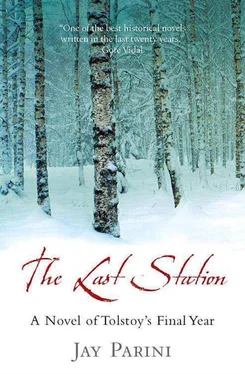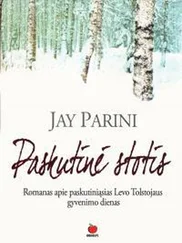The trouble started when Akhmet seized a local muzhik, Vlasov, who had ‘stolen’ a sapling from the wood. Akhmet tied him brutally with a piece of hemp and dragged him on the ground back to the house, where Mama scolded the peasant harshly and said that if he were caught again he would be banished from the Master’s property.
Papa unexpectedly stepped into the kitchen, drawn by the commotion. ‘Do you expect me to stand quietly aside while you mishandle a good friend?’ Papa asked her.
‘He’s a muzhik, dear,’ Mama said. ‘You never did understand social distinctions.’
‘He’s a human being, and we have known each other for many years.’
Mama objected that Vlasov was caught stealing, and that if everyone thought it possible to steal what they liked, there would be no end to theft at Yasnaya Polyana. ‘That’s just like you,’ she said. ‘You want to give everything that we have away. If your grandchildren end up as paupers, it will mean nothing to you. You, of course, never wanted for anything. You have been pampered and protected your entire life, and you don’t even realize it.’
‘Vlasov is free to help himself to whatever he needs,’ Papa said, barely under control. He pointed to Akhmet with a shaky finger. ‘And I insist that you dismiss your foolish guard at once.’ I thought he might swoon.
Later, I found Papa in his study, his head buried in his hands. He was like a world drained of light.
‘It’s very painful,’ he said, taking my hand. ‘Your mother was absolutely right about me. I have lived my life in a glass house, utterly protected, coddled. I know nothing of the world.’
‘That’s foolishness, Papa,’ I said. ‘You mustn’t pay attention to her.’
I kissed him on the head and rubbed his neck.
That day he did not come down to lunch.
Mama looked at me and said, ‘He is torturing himself and he is torturing me. Why can’t he behave in a normal way? Everything with him is hysterics.’
In the days that followed, Papa declined swiftly. He would sit in his study for hours at a time, writing nothing. His diary straggled off into incoherent ramblings. One day he came home from a long walk in Zasyeka Wood, his face livid, the sweat standing on his brow. I put him to bed and called Dushan Makovitsky, who took his pulse.
‘It is weak, I’m afraid,’ he said, with the gloom in his voice one expects of Dushan Makovitsky.
Papa had fallen into a deep sleep, his jaw open. He was breathing roughly through the mouth, a slight membrane, a bubble, glistening on his lips. Occasionally, his tongue darted out between his gums.
Mama, behind us, began to cry softly into a scarf.
‘Stop it,’ I said to her. ‘You’ll wake him up.’
We kept a vigil at his bedside while he slept. When he woke, an hour later, he said, ‘I must speak to Vladimir Grigorevich. Ask him to wait for me in my study.’
I squeezed his hand, now limp and wet. ‘He is not here, Papa,’ I whispered. ‘He’s in Meshcherskoye. You will see him there next week.’
What brought about Papa’s recovery, I suspect, was the upcoming trip to Meshcherskoye. He simply had to see Chertkov again. And Mama, to my amazement, announced that she was not going with us. She knew Papa wanted a few days of peace beside his ‘beloved Chertkov.’
I began to worry about Mama. She seems so fragile and withdrawn. And Papa worried, too. It was most unlike us.
‘We can’t possibly leave her here alone,’ he said. ‘Of course I’d rather go without her. But this won’t do.’
‘Let me ask Varvara to stay with her. She’ll alert us if anything goes wrong. Please, Papa.’
It was hard to convince him, but he agreed when
Varvara seemed happy enough to stay behind. She does not, herself, find Chertkov’s company amusing. ‘He is a bore,’ she said. ‘And he hates women.’
The visit to Meshcherskoye, for me, was not the same without Varvara. It’s painful for me to separate from her, even for a brief time. But I promised to write every day. Somehow, the thought of being able to write affectionate letters made the separation bearable, even attractive.
The night before we left, I stole into Varvara’s room when the house was sleeping and lay my head on her shoulder; I nestled beside her for an hour or more, listening to her breathe, watching the rhythmical swell of her breast like waves cresting offshore, plunging onto shingle, gathering, cresting again. Her hand folded a lock of my hair backward and forward. It was lovelier than sleep.
The next morning we left on horseback, riding to the Tula station in a small pack like a gang of thieves. There were three of us besides Papa: Dushan Makovitsky, Bulgakov, and a servant, Ilya Vasilyevna. Papa led us forward like a Cossack charging into battle.
Papa reined in his horse at the prison in Tula, a small white building with tiny, depressing windows covered with an iron grate. He shook his head.
‘Gusev was imprisoned there,’ Dushan Makovitsky said to Bulgakov, who wants to know everything. Dushan recalled other Tolstoyans who had spent time in that oppressive building, and Papa laughed suddenly, describing the place as his ‘very own jail.’
We rode all day in a cramped second-class compartment, arriving at Meshcherskoye in time for dinner. It is a simple house – unadorned, rather ugly. It’s dirty, too. Followers of Papa jammed the hallways, disciples recruited by Chertkov from intellectual circles in Moscow and St Petersburg, a motley band of young dreamers. Many of them are frauds. But Papa delighted in their company, pouring himself into their midst, chatting freely, answering questions, offering counsel and criticism. Attention, for him, is like sunlight on a plant. He comes alive in the warm rays.
At dinner, as is the custom with Chertkov, we all sat en famille , including the servants. But the servants sat gloomily at one end of the table, saying nothing. Ilya would not countenance sitting at the same table as ‘the Count’ and huddled by himself in a dark corner. Papa took him a plate of vegetables, a slice of goat cheese, and a piece of black bread. Everyone watched in awe.
‘It is like Christ washing the feet of his disciples,’ said Dushan Makovitsky in my ear, whose gift for the obvious is spectacular.
During the meal, Papa was asked what to read.
‘Disregard all literature written during the last sixty years!’ he answered.
‘What do you recommend to them?’ Vladimir Grigorevich asked. ‘Pushkin, perhaps?’ He was supremely happy, with Tolstoy at his table, his followers about him.
‘Yes, and Gogol, too. Gogol is superb. And foreign writers. I recommend Rousseau, Hugo, and Dickens. As usual, most Russians want to read only what is new. They grow quite breathless at the mention of What’s-his-name… Grut – Mut – Knut Hamsun! They rave about Ibsen and Bjørnson. But to know Rousseau and Hugo only by hearsay, by an entry in the encyclopedia!’
Normally, Papa is keen on looking things up in the encyclopedia. He has the entire Brockhaus Efron beside his desk, and he consults it almost daily. He adores reading about strange countries and customs, packing away bits of knowledge for later use. Long ago he realized that, for the sake of an argument, there is no substitute for facts. You can silence an opponent quickly with the right information. You can also command the attention of a group by citing statistics and dispensing pieces of erudition. In keeping with this, Papa soon began talking about the island of Formosa, which has interested him recently.
‘It’s an island that the Japanese have just captured,’ he explained to the company, most of whom took frantic notes, hoping to catch every utterance in their penciled scrawls. ‘Imagine! The island is full of cannibals! Eaters of human flesh!’ Papa’s eyeballs widened like saucers.
Читать дальше












